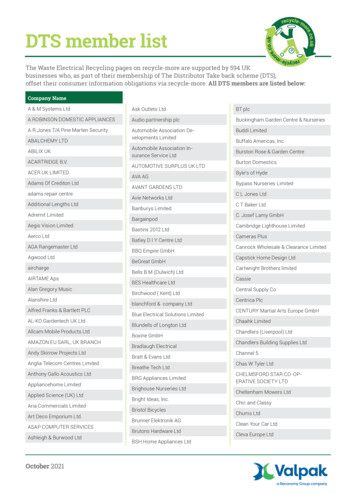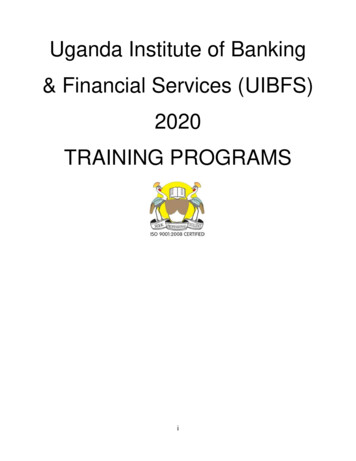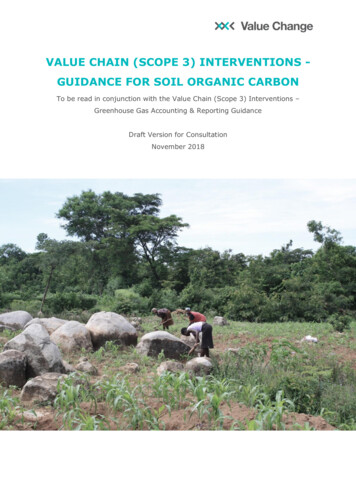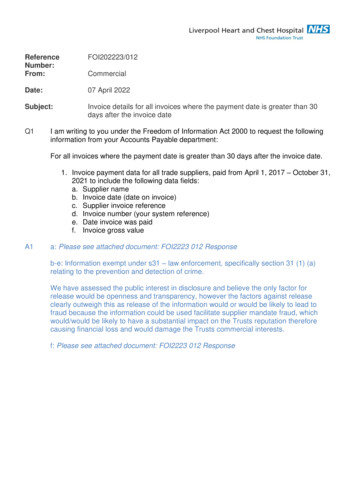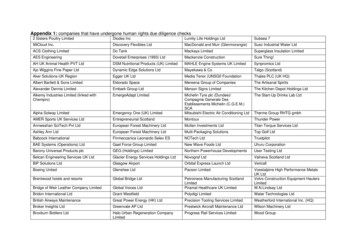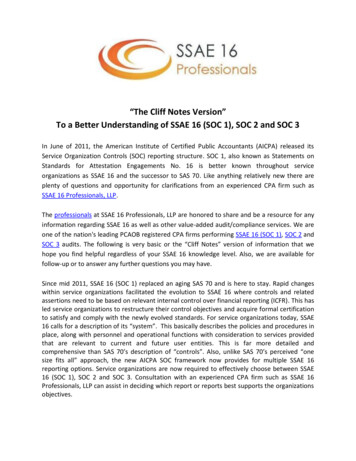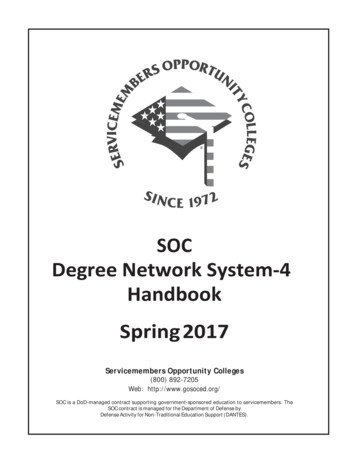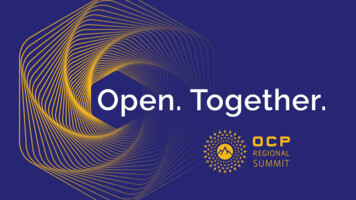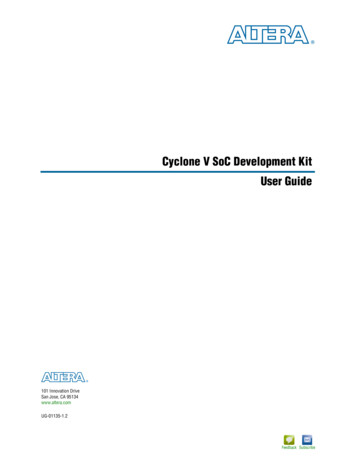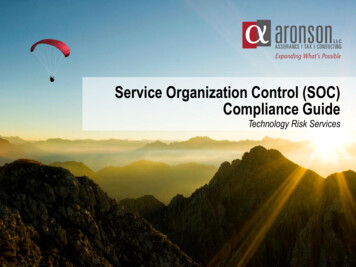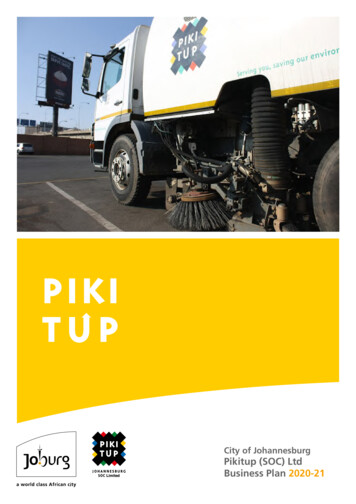
Transcription
City of JohannesburgPikitup (SOC) LtdBusiness Plan 2020-21
www.pikitup.co.za
Table of ContentsList of Abbreviations2Foreword by the Chairperson0Foreword by the Managing Director0Official Sign-off6Introduction7Organisational Review7Strategic Analysis12Strategic Response14Stakeholder Engagement21Implementation and Performance Overview26Financial Impact70Risk Assessment75Organisational Environment76Human Capital80Pikitup Service Standards83Research, Technology and Systems84Conclusion8401
ABBREVIATIONSBCB.Business Continuity PlanningCAO.Chief Audit OfficerCCS.Commercial and Customer Services of PikitupCoJ.City of JohannesburgDIFR.Disabling Injury Frequency RateEAP.Employee Assistance ProgrammeEIA.Environmental Impact AssessmentEISD.Environmental and Infrastructure Services DepartmentEPWP .Extended Public Works ProgrammeERM .Enterprise Risk ManagementESPExpanded Social Package.GDARD .Gauteng Department of Agriculture and Rural DevelopmentGDS .City of Johannesburg Growth and Development StrategyGHG.Greenhouse GasGLU.Government of Local UnityIDP.Integrated Development Plan of theCity of Johannesburg aligned withChapter 5 of the Municipal Systems ActIWMF .JMPD .Integrated Waste Management FacilitiesJPC.Johannesburg Property CompanyKPI.Key Performance IndicatorLFG.Landfill GasLoS-1.Johannesburg Metropolitan Police DepartmentLevel of Service 1 – the highest provided by Pikitup – is the provision of a240l wheelie bin and curb side waste collection once a week. At areaswhere Separation at Source has been rolled out, the recyclables arecollected once a week.LoS-2.Level of Service 2 is the provision of an 85l waste bag and curb side wastecollection once a week or more. At areas where Separation at Source hasbeen rolled out, the recyclables are collected once a week.LoS-3.Level of Service 3 is the provision of a strategically placed 6m³ communalwaste skip and bi-weekly to daily waste collection. At areas whereSeparation at Source has been rolled out, the recyclables are collectedonce a week.MFMA .MMC .Municipal Finance Management Act, 56 of 2003MRF .MTEF .Material Recovery FacilityMTREF.Medium Term Revenue Expenditure FrameworkR&CRM.Member of Mayoral CommitteeMedium Term Expenditure FrameworkRevenue and Customer Relations Management Department of theCity of Johannesburg02
ABBREVIATIONSRCR.Refuse Collection RoundsRRLP.Resource Recovery and Logistics PlanS@S.Separation at SourceSDBIP .Service Delivery Budget Implementation PlanSLAService Level Agreement.SOC .State Owned CompanyWtEWaste to Energy.WbW .Ward-by-WardTVR .National Treasury Views and Recommendations03
Pikitup - Business Plan 2020-211. Executive SummaryPikitup Johannesburg is mandated to provide refuse removaland waste management services to the residents ofJohannesburg.Established in 2001 as a SOC Ltd, the Company is 100%owned by the City of Johannesburg and its Board isappointed by the City. Oversight is led by Councillor MphoMoerane with the Environment, Infrastructure and ServicesDepartment (EISD), and the City's Group GovernanceDepartment.Pikitup makes a meaningful impact by aligning its activitieswith the City of Johannesburg's Growth and DevelopmentStrategy (GDS 2040). Doing so contributes to the City'sresource security, environmental sustainability, goodgovernance, and the ideals of resilience, liveability, andsustainability.This Pikitup 2020-2021 Business Plan responds to theneed to develop a resilient, liveable, and sustainable urbanenvironment, underpinned by infrastructure supportive of alow carbon economy. In turn, it is informed by the City's 11Mayoral Priorities and the related Priority ImplementationPlans.Councillor Mpho Moerane overseeing thesanitisation of the Waterval Pikitup Depot trucks04A community driven approach to waste prevention andminimisation requires innovative solutions and theimplementation of projects with partnerships andstakeholder involvement. Creating opportunities fordevelopmental service delivery and for communities to takeresponsibility for the way services are delivered contributesto alleviating poverty, inequality and unemployment.Service delivery excellence, implementation of the flagshipprogrammes, communication, and stakeholder engagementunderpin Pikitup's business planning and implementation.These focus areas are aligned with those of the City ofJohannesburg's 2020-2021 financial year, the fourOutcomes of the GDS 2040, and its objectives andprogrammes.This Pikitup 2020-2021 Business Plan also addressesorganisational transformation in the context of building aneffective and efficient company that delivers world classservices.Pikitup has identified the following 5 Goals and the relatedimplementation action.
Pikitup - Business Plan 2020-21Goal 1: Integrated WasteManagement and Waste PreventionThe implementation of mutually beneficial projects willensure the prevention and minimisation of waste, andthe diversion of waste from landfills.All the waste streams in the City of Johannesburg will betackled to prioritise re-use, recycling and recoveryactivities, and the necessary infrastructure to supportthese initiatives.The projects include the rollout of Separation at Source.This is already regulated as mandatory, with enforcementand complete implementation delayed to allocateappropriate funds, create education and awareness, andfacilitate enforcement of by-laws. Partnerships associatedwith the establishment of buy back centres to stimulatethe recycling economy and leverage waste reclaimingactivities are a key focus area.Other projects are related to the diversion of builders'rubble which will involve consideration of re-purposingand possible commercialisation of builders' rubble,processing of green waste for increased revenuegeneration and SMME development. Given that some ofthe interventions require technological solutions, the keyto successful implementation is collaboration with theprivate sector.Goal 2: The Waste Value ChainIncentives and disincentives will be used to realise valuefrom waste throughout the value chain. Incentives tominimise waste will include recycling and the extractionof valuable waste from the waste streams forreproduction.improves the health and quality of life of its citizens.Collecting and managing waste across the inner andouter City includes hostels and informal settlements andthe addressing of illegal dumping.Responsive, effective, and efficient service delivery willinclude the creation of a dedicated Pikitup CustomerContact Centre responsive to customer queries,complaints, and customer access.Goal 4: Partnershipsand StakeholdersBehavioural change in the home and in the workplace iskey to the success of waste prevention and minimisation.To unlock behavioural change significant resources willbe allocated to developing partnership and involvingstakeholders in education and awareness initiatives.Communities across the inner and outer City will beincluded in the target audiences.The Programme will include intensifying the communitycleaning campaign called KleenaJoburg which is aimedat addressing illegal dumping, littering, and creatingeducation and awareness of good waste managementpractices.Goal 5: An Effective Efficient ViableWaste Management CompanyPikitup's effectiveness, efficiency, and viability isunderpinned by effective internal controls aimed atsupporting good governance, customer, and stakeholderconfidence and efficient service delivery. Achieving thisgoal means that operations and logistics will embrace:ŸPikitup's contribution to the establishment of a recyclingeconomy in the City of Johannesburg will focus on themutual benefit for communities and entrepreneurs. Atthe centre of this intervention is the establishment andfacilitation of co-operatives to participate in recyclingactivities, cleaning of areas and addressing illegaldumping.ŸŸŸŸŸŸŸGoal 3: Effective Delivery ofWaste ServicesPikitup’s service delivery will focus on responsiveness andefficiency while simultaneously implementing the wasteprevention and minimisation projects. Waste removalservices will contribute to ensuring a clean City ofJohannesburg that builds investor confidence andŸŸEconomic and financial analysisEvidence based planningOperations managementFinancial and human resource management bestpracticesAppropriate policies and internal controlsEffective risk managementBuilding a skilled workforce aligned with the strategyProductivity and business improvement measuresInternal and external communicationOptimised fleet and waste logistics management.These goals will contribute to Pikitup realising its visionof being the leading integrated waste managementcompany in Africa and amongst the best in theWorld05
Pikitup - Business Plan 2020-21OFFICIAL SIGN-OFFWe hereby certify that this 2020-2021 Business Plan was developed by Pikitup with both internal and externalstakeholder contributions.The development of the Business Plan has taken into account the current operating environment, the Shareholder'sstrategic intent, forward looking Board resolutions, policies, legislation, and the Pikitup mandate. It accurately reflectsthe strategic goals and objectives that Pikitup will endeavour to achieve over the fiscal 2020-2021 period. ThisBusiness Plan is aligned with the approved City of Johannesburg's Integrated Development Plan 2020-2021 and its 11Priorities.Date:26/06/2020Ms Bukelwa NjingoloManaging Director:Pikitup Johannesburg (SOC) LtdDate:26/06/2020Ms Getty SimelaneChairperson of the Board of Directors:Pikitup Johannesburg (SOC) LtdDate:Councillor Mpho MoeraneMember of the Mayoral Committee:Environment, Infrastructure and Services Department0626/06/2020
Pikitup - Business Plan 2020-212. IntroductionPikitup's mandate flows from its 2001 establishment as aSOC Ltd with 100% of the shareholding vesting in the Cityof Johannesburg. The main purpose of Pikitup Johannesburgis to provide municipal waste services on behalf of the Cityof Johannesburg.The City appoints the Pikitup Board and oversight andgovernance monitoring is provided respectively by the City'sEnvironment, Infrastructure and Services Department (EISD),and its Group Governance Department.This Pikitup 2020-2021 Business Plan is aligned with the Cityof Johannesburg's Growth and Development Strategy andthe City's eleven (11) strategic priorities.Partnering with communities and stakeholders willcontribute to realising Pikitup's 2020-2021 Goals.ŸGoal 1 Integrated Waste Management andWaste PreventionŸGoal 2 The Waste Value ChainŸGoal 3 Effective Delivery of Waste ServicesŸGoal 4 Partnerships and StakeholdersŸGoal 5 An Effective Efficient Viable WasteManagement Companyit is this review that reflects on the commitments made thusfar - and sets the tone for the ‘final push’ needed to achievethe empowering – and sobering – goals set out by thecurrent Integrated Development Plan (IDP).This will see Pikitup consolidate actions to ensure basicservices are delivered to the highest feasible standards, andacceleration of actions which drive and enable the social andeconomic transformation goals set by this IDP.3.2. Strategic ContextThe National Waste Management Act and the NationalWaste Management Strategy adopted in 2011 flowed fromthe Polokwane 'call to action' in September 2001. Thesigning of the 2001 Declaration committed South Africa toachieving a reduction of 50% in the volume of wastegenerated and a 25% reduction in the volumes of land-filledwaste by 2012, and a zero-waste plan by 2022.The National Waste Management Strategy shifted the focusof waste management away from disposal of waste toavoidance, reduction, re-use, and recycling before handlingand final disposal. Doing so applied the principles ofaccountability, 'cradle to grave' responsibility, equity,integration, and waste avoidance and minimisation.Strategic action planning therefore moves away fromfragmented and uncoordinated waste management tointegrated waste management.company in Africa and amongst the best inPikitup operates in the entire 1 625 km² area within CoJ,serving approximately 5.05 million people, with a limitedpart of the area being serviced by private operators. Thetotal waste handled and managed by the entity in the citythe Worldfor the year under review (2017/18) was approximately 1.4Towards realising the vision of being the leading integrated waste managementmillion tons, 94 355 tons was diverted away from thelandfill sites and the rest disposed of at landfill sites.3. OrganisationalOverview3.1 Strategy Framework and ContextPikitup is an entity of the City of Johannesburg and thus hasto ensure that its initiatives and plans are aligned with thepriorities and targets of the City of Johannesburg. Inaddition there are various national and provincial strategiesand policies that inform the proposed targets.Pikitup services for the overall cleanliness of the City's 9 000kilometres of streets, municipal open spaces, andcommercial services, is provided to approximately 9 124businesses.In addition to the National Waste Management Strategyimperatives, the Growth and Development Strategy (GDS2040), and the Integrated Waste Management Planinfluences Pikitup's vision, mission, and values.This is the last business plan review of the current LocalGovernment political term. It is this review that begins theprocess of drafting the end of term report. Most importantly,07
Pikitup - Business Plan 2020-21What guides our business?To be the leading integrated wastemanagement company in Africa and amongstthe best in the WorldTo provide integrated, sustainable, andinnovative waste management services thatensure waste reduction; re-use; recycling andrecovery, and consider waste disposal(landfilling) as the last resort.VISION STATEMENTMISSION STATEMENTValuesPEOPLE CENTRIC:We work tirelessly to show a deep respect for human beings inside our companyand for the communities in which they live, while ensuring our work reflects the diversityof our people.INTEGRITY:We are honest, open, ethical, and fair. People trust us to adhere to our word.KNOWLEDGEABLE:We strive to employ best practices that seek to minimize negative impacts of waste onthe environment.INNOVATION:We aim to achieve a culture of innovation and continuous improvement.TRUSTWORTHINESS:We endeavor to get it right the first time, every time, on time with candid communicationwith our customers and communities when we don’t.UNITY:We pull together as a team to drive success, knowing that our success depends on our ability tohelp our customers, communities receive value added services.PASSION:Passion is at the heart of our company. We are passionate about continuously driving sustainableenvironmental practices that achieve the most efficient and effective use of our resources.08
Pikitup - Business Plan 2020-21Legislative EnvironmentPikitup's compliance bridges specific legislation like that of waste management, and general legislation. The latter includesgeneral management of a public entity and labour legislation. Compliance monitoring is included in Pikitup's RiskManagement policy and processes.LegislationJurisdictionAtmospheric Pollution Prevention Act, 45 of 1965NationalBasic Conditions of Employment Act, No.75 of 1997NationalBroad-based Black Economic Empowerment Act, No.53 of 2003NationalThe Constitution of the Republic of South Africa Act No.108 of 1996NationalCivil Proceedings Evidence Act, No.25 of 1965NationalCity of Johannesburg Waste Management By-LawsProvincialCompanies Act 71 of 2008NationalCompetition Act, No.89 of 1998NationalConsumer Protection Act, No.68 of 2008NationalCopyright Act, No.98 of 1987NationalCriminal Procedure Act, No.51 of 1977NationalDepartment of Water Affairs and Forestry. 1998: Minimum requirementsfor waste disposal by land fill, (2ndEd), Republic of South AfricaNationalDesigns Act, No.195 of 1993NationalElectronic Communications and Transactions Act, No.25 of 2000NationalEmployment Equity Act, No.55 of 1998NationalIncome tax Act, No.58 of 1962NationalInformation Act, No.70 of 2002NationalKing IV Code on Corporate GovernanceNationalLabour Relations Act, No.66 of 1995NationalLegal Deposits Act, No. 54 of 1997NationalMedical Schemes Act, No.131 of 1998NationalMunicipal Finance Management Act, No.56 of 2003NationalMunicipal Structures Act, No.117 of 1998NationalMunicipal Systems Act, No.32 of 2000NationalNational Archiving Act, No.43 of 1996NationalNational Environmental Management: Air Quality Act No.39 of 2004NationalNational Environmental Management Biodiversity Act, No.10 of 2004NationalNational Environmental Management Waste Act No.59 of 2008NationalNational Health Act, No.61 of 2003NationalNational Road Traffic Act, No.93 of 1996NationalNational Water Act, No 36 of 1998National09
Pikitup - Business Plan 2020-2110LegislationJurisdictionOccupational Health and Safety Act No.85 of 1993NationalPension Funds Act, No.24 of 1956NationalPreferential Procurement Policy Framework Act, No.5 of 2000NationalPrescription Act, No.68 of 1969NationalPromotion of Access to Information Act, No.2 of 2000NationalPromotion of Administrative Justice Act, No.3 of 2000NationalProtected Disclosures Act, No.26 of 2000NationalProtocol on Governance in Public SectorNationalPublic Audit Act, No.25 of 2004NationalRoad Traffic Act, No.29 of 1989NationalRoad Accident Fund Act, No.56 of 1996NationalSkills Development Act, No.97 of 1998NationalSkills Development Levy Act, No.9 of 1999NationalStamp Duties Act, No.77 of 1968NationalTax on Retirement Funds Act, No.38 of 1996NationalThe Compensation for occupational Injuries and Diseases Act, No.130 of 1993NationalThe Environment Conservation Act No.73 of 1989NationalThe National Environmental Management Act No.107 of 1998NationalUnemployment Insurance Act, No.63 of 2001NationalUnemployment Insurance Contributions Act, No.4 of 2002NationalValue Added Tax Act, No. 89 of 1991National
Pikitup - Business Plan 2020-21Pikitup’s MandateThere are two categories of services that Pikitup provides:Ÿ Municipal ServicesŸ Commercial ServicesPikitup services comprise of provision of:Ÿ collection and disposal of domestic wasteŸ street cleaningŸ area cleaningŸ management of litter binsŸ collection of legally dumped wasteŸ collection and disposal of animal carcasses found in apublic placeŸ operation of garden sites.Pikitup operates 12 waste management depots that arestrategically located across the City’s seven regions.It manages 42 drop off sites, four operational landfill sites,and two closed landfill sites. In the northen regions somewaste is disposed of at three privately owned landfill sites –Mooiplaats, Chloorkop and FG.All landfill sites comply with permit requirements and arelicensed and regulated by the National Department ofEnvironmental Affairs (DEA). Pikitup is regulated by theGauteng Department of Agriculture and Rural Development(GDARD).and Commercial Services that include bulk collection, landfillmanagement, and fleet management.11
Pikitup - Business Plan 2020-214. Strategic AnalysisJohannesburg contributes 5.8 million people to the totalpopulation of Gauteng – the fastest growing province in thecountry.Migration to the Province rapidly affect urbanisation,population growth, and associated economic development.The resultant increased waste generation places pressure onPikitup's service delivery.PoliticalŸŸŸŸŸChange in policy in relation toprogrammes: i.e. S@S supportthe paradigm shift beingimplemented to realize thenew business model focusedon job creation andentrepreneur development,realisation of valuethroughout the waste valuechain.Labour instability.Inability to always complywith National Strategy (e.g.Polokwane declaration onwaste management targets)Change in priorities arisingfrom changes in politicaladministrations e.g. 2021local government electionswill have an impact on thechange of the governmentmandate.Frequency of change in Boardmembers (1 year contract) canresult in continuity lapses,multiple mandate changesand loss of organisationalmemory.The PESTEL management tool provides a framework foranalysing how the external political, economic, social,technological, environmental, and legal factors impact on anEntity. Pikitup's PESTEL factors below give a bird's eye viewof its external environment that will be considered duringthe implementation of this Business Plan.EconomicŸŸŸŸŸŸŸ124.1 The PESTEL AnalysisAbility of residents to pay forservices (cost reflective tariff)in the context of a difficulteconomy.Commercial services notcompetitive and agile, sopotential customers use otherservice providers, inability ofPikitup to optimally providethe service due to fleetinadequacy.Lack of landfill expansionbudgets together with thelong distances to landfills,disposal facilities and disposalcosts result in illegal dumping.Increase EPWP and CoOperatives support tomitigate high unemploymentlevels, and ensure wastemanagement contributes increating job opportunities.Inadequate network ofbuyback centres results influctuations in the prices ofrecycled materials, thusimpacting sustainability ofcooperatives and recyclingeconomy within the city ofJohannesburg.Few local off-take agreementsto stimulate demand forrecycled materials.Unfunded mandate: Currenttariffs are not cost reflectiveand do not support wasteminimisation.ŸŸŸŸInvestment and budgets setaside to influence behaviouralchange are insufficient, hencethe slow response by citizens.Inability to create traction onPublic Private Partnerships(PPP).Pikitup's resilience tochanging economic factorssuch as inflation, rates, globalratings and general economy.Maintaining cleanliness inareas is a driver for attractingeconomic activity.SocialŸŸŸRehabilitation of companyreputation continues to findtraction, resulting in improvedconfidence in our ability tomake the paradigm shift anddeliver on services.Growth of the City as well asdensification not aligned tothe available services andinfrastructure for wastemanagement.Population/Waste growth:Unsustainable and growingneed for basic services – lessfunding available for servicesdue to competing needs.
Pikitup - Business Plan 2020-21SocialŸŸInefficient service delivery willresult in health problems.Lack of an integratedcommunication strategy tostakeholders and communitiesaround waste management.ŸŸŸLegalŸŸŸRisk and cost of compliancewith regulations andlegislation.Inadequately integrated bylaw enforcement strategy e.g.illegal dumping, environmentpolluting entities.Delay in leveraging bylaws donot encourage and promotereduce, reuse and recycling(RRR philosophy).EnvironmentalTechnologicalŸŸDelayed adoption ofAlternative WasteTechnologies by Pikitup.Inadequate internal capacityfor practical research andconcept development.Inability to develop a fit-forpurpose PPP framework toensure cost effectiveimplementation of relevanttechnological solutions.Green technological solutionsoften perceived as reducingjob opportunities. Use oftechnology as an enabler forjob creation e.g. data analysisand data mining.Implementation of solid wastemanagement systems: ITinfrastructure to addresschallenges i.e. RFID tags,weighing systems, fleetmanagement etc.ŸŸŸŸŸŸWaste management activitiescontribute to CO2 emissionsand other environmentalfactors.No incentive and dis-incentivein place to encourage the RRRactivities e.g. communitydriven initiatives to managewaste.Risk and cost of compliancewith regulations andlegislation.Adoption of cleantechnologies to reduce carbonfootprint.Long lead times to obtain thenecessary licenses and otherapprovals for wastemanagement facilities andactivities.Resilience of the city andorganisation to the impacts ofnatural disasters andpandemics (e.g. Covid-19)4.2 Strengths, Weaknesses, Opportunities and Threats Analysis(SWOT Analysis)Pikitup will capitalise on its strengths and address its weaknesses during the implementation of this Business Plan. Whiletaking cognisance of the PESTEL factors beyond its control, Pikitup will leverage the opportunities and limit the threatsidentified in the SWOT analysis.InternalStrengthsŸŸŸŸŸSustained implementation of EmployeeWellness Programme.Sound policies and strategiesNew executive and senior leadership withtransformative and innovative mindsetPikitup brand visibility and recognition bypublicCaptive market as ascribed by core mandate.WeaknessesŸŸŸŸŸŸŸŸPartnerships with business, labour and civilsociety not fully developedWeak solid waste business systems Slow inbridging the skills gapWorking in silos.Non-adherence to policies, procedures andregulations.Lack of contract and project managementcapacityFailure to recognise and maximise revenueSlow turnaround times in delivering wastemanagement servicesLack of capacity for by-law enforcement13
Pikitup - Business Plan portunitiesŸŸŸŸŸŸŸŸŸŸPoor customer relationship managementPoor ICT systems and capacityContinued labour discord and disputesThreatsAlternative waste management strategydevelopment and execution (biogas, waste toenergy projects)Room to improve on brand managementCommunity based projects to assist withcleaning and monitoringPartnerships with private sector to divert wasteRepositioning of Commercial BusinessParticipation in and influencing of by-law toalign with organisation capacity and capabilityWard based operating modelCitizens' involvement and behavioural changeAdvance the implementation of S@S, RRR andCommunity Works ProgrammesExperience and building track record in thewaste management sectorŸŸŸŸŸŸŸŸŸŸLandfill airspace depletionGrowth in population and increased wastegenerationFunding for implementation of various projectsSusceptibility to natural and health disasters(pandemic)No new landfill site planned for future needsService delivery protestsEconomic slowdown and inability of customersto pay for servicesAgeing infrastructure, depletion of landfillairspace, condition of plant, equipment andfleet.Inordinately large workforce at lower levelsFraud and corruption5. Strategic ResponseThe National Waste Management Strategy, 2011 shifts thefocus of waste management away from disposal of waste toavoidance, reduction, re-use, and recycling before handlingand final disposal. The strategy applies the principles ofintegration, waste avoidance and minimisation in its actionplans which aim to move away from fragmented anduncoordinated waste management to integrated wastemanagement.The GDS 2040 waste to landfill target for this planningperiod is approximately 2.4 million tonnes (circa) by 2021including waste handled by private operators (600 000tonnes per annum) but excluding growth.In order for Pikitup to make a meaningful impact, based onits core mandate, to contribute to resource security,environmental sustainability and good governance in theCity of Johannesburg, the resources of the company must bedirected towards the activities envisaged by the City ofJohannesburg's Growth and Development Strategy(GDS 2040).In the GDG 2040 of the CoJ, the vision is to be 'a WorldClass African City of the Future – a vibrant, equitable African14city, strengthened through its diversity; a city that providesreal quality of life; a city that provides sustainability for all itscitizens; a resilient and adaptive society' (Joburg 2040).The GDS 2040 outcomes are outlined as follows:ŸŸŸŸOutcome 1: Improved quality of life for allOutcome 2: Provide a resilient, liveable, sustainableurban environment – underpinned by infrastructuresupportive of a low-carbon economyOutcome 3: An inclusive, job-intensive, resilient andcompetitive economyOutcome 4: A high performing city government thatbuilds towards the global Gauteng City RegionWith this Plan, Pikitup embraces its mandate and how itcontributes to Outcome 2 of GDS 2040. In doing so itfosters sustainable communities by focusing on optimisingits core mandate that contributes to ensuring that residentsand businesses in the CoJ have access to safe, reliable,efficient, and affordable solid waste handling and disposalservices.
Pikitup - Business Plan 2020-21This Plan highlights how the management of solid waste hasevolved from a relatively simple system of waste collectionand disposal to a much more complex network of collection,transportation, and processing of waste, recyclables, greenwaste, and builders' rubble. It is therefore critical that Pikitupmakes sound decisions, to ensure that plans for facilities,services, and programmes meet the future needs of the Cityof Johannesburg.Pikitup has committed to the 11 strategic priorities of the City of Johannesburg as follows:GoodGovernance0102JobOpportunityand CreationSa
R&CRM Integrated Development Plan of theCity of Johannesburg aligned with Chapter 5 of the Municipal Systems Act Integrated Waste Management Facilities Johannesburg Metropolitan Police Department Johannesburg Property Company Key Performance Indicator Landfill Gas Level of Service 1 - the highest provided by Pikitup - is the provision of a
